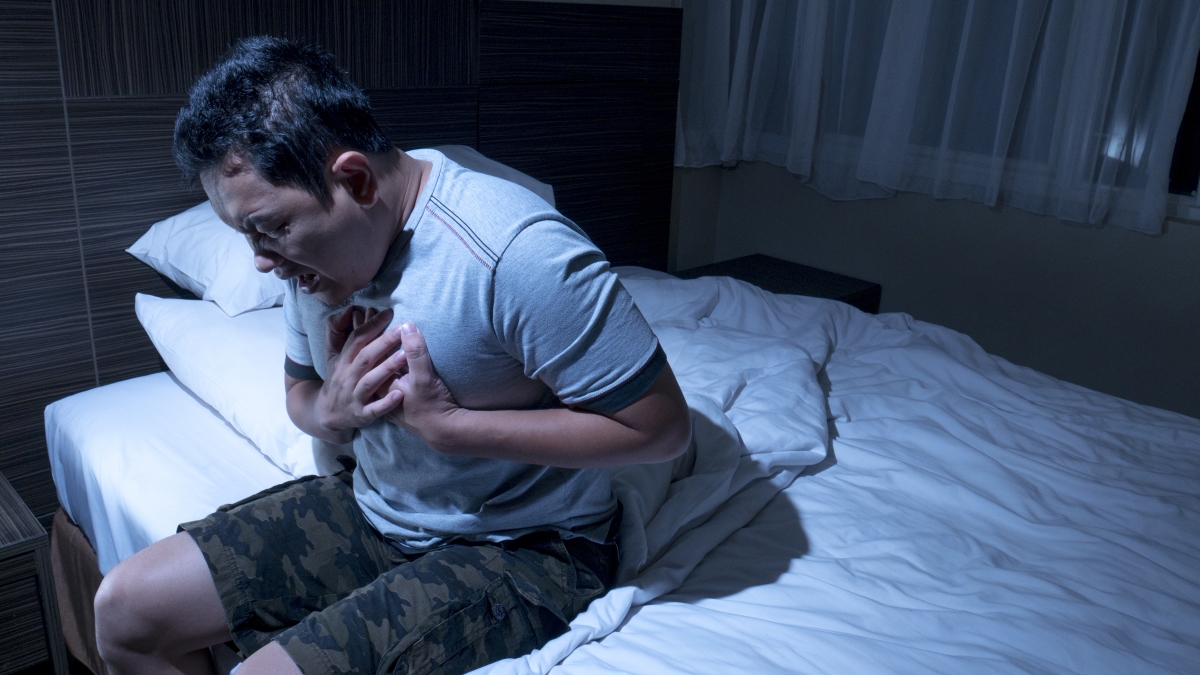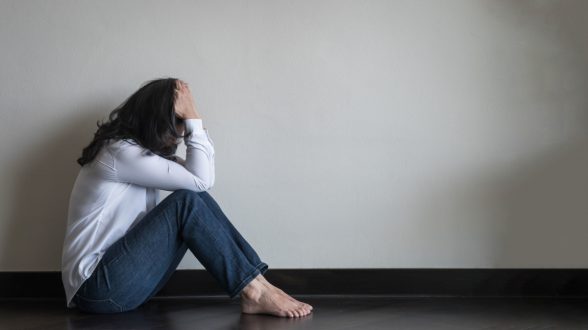
You are sleeping soundly when all of a sudden you bolt awake, a cold fear gripping you. Breathing heavily, with your heart rate off the charts, you try to figure out what is happening—did you hear a noise, have a heart attack or wake up from a bad dream? What is going on? Before you get the answer to that question, a sense of calm overtakes you, and you feel your stomach unclench from the anxiety of the past few minutes. You’re left to wonder: What just happened?
What happened was a nocturnal panic attack. The Anxiety and Depression Association of America defines these episodes as “the abrupt onset of intense fear or discomfort that reaches a peak within minutes.” In addition to the psychological effects, panic attacks can also trigger a tide of physiological symptoms that mimic life-threatening conditions. While panic attacks subside in mere minutes after onset, they are scary because they can occur out of the blue or stem from a particular anxiety, and while you are in the midst of one the fear can seem overwhelming and uncontrollable. Panic attacks can also signal that you may be suffering from a panic disorder. This is a type of anxiety disorder that afflicts 6 million adults in the United States, according to the Anxiety and Depression Association of America.
If you’ve ever experienced a panic attack, you know firsthand it can be an unpleasant, even deeply troubling, experience. It is important, therefore, to understand more about what panic attacks are and how they can be treated so you don’t have to suffer from them any longer.
How To Recognize a Panic Attack
Because they come on suddenly and manifest with physical and emotional signs, panic attacks can be confusing and difficult to identify in the moment, especially if they are nocturnal, waking you from your sound sleep. Generally, a panic attack is of a fairly short duration, peaking after roughly 10 minutes, although it can take much longer than that to wind down from a nocturnal panic attack. You may feel too disturbed to be able to fall back asleep right away.
There are several signs that you should know about that indicate you are having a panic attack. For a full-blown panic attack, at least four of these symptoms will be present; less than four means you are experiencing what is called a limited-symptom panic attack. The signs:
- Shakiness or trembling
- Difficulty breathing, including a choking sensation, shortness of breath or feeling smothered
- A rush of cold or heat through the body; it can also include sweating
- Cardiac concerns, including chest pain, a racing heart or palpitations
- Feeling sick to the stomach
- Lightheadedness or dizziness to the point of feeling faint
- Feeling numb or tingly
- A sensation that you are outside of your body or detached from the panic attack
- Fear of losing your mind or dying
These symptoms can be very intense in the heat of a panic attack, but you can try to remember that it will pass when the panic attack does.

The Causes of Nocturnal Panic Attacks
Nocturnal panic attacks are a bit of a mystery, as there is no known reason why one should occur while you are asleep. However, if a panic attack occurs during the night, there is a chance you could also have one during the day. If you have multiple panic attacks, that can be a clue you have a panic disorder.
There are certain triggers that can make you more likely to have a panic attack. There may be a genetic component to this condition, such as having a family history of panic attacks. Gender can also be a factor; women are twice as likely to have panic attacks than men. Panic attacks can also be brought on by an extremely stressful life event or traumatic incident. If you don’t handle stress well, especially during times of life change, that may also increase your risk for panic attacks. Other factors include childhood abuse (physical or sexual), changes in neurological function or smoking or drinking caffeine too much.
Finally, panic attacks can co-occur with other types of disorders, and in fact be triggered by them. For instance, someone with deep social anxiety may experience a panic attack if they are alone at a large party or must give a speech in front of a lot of people. Instead of panic attacks occurring spontaneously without warning, in these cases a person may begin to anticipate that a panic attack can occur if faced with a situation that feels threatening.
How to Prevent (and Treat) Nocturnal Panic Attacks
The bad news is that there is no single magic cure to stop nocturnal panic attacks from happening. The good news is that there are some treatment methods you could try to alleviate them. If you have a nocturnal panic attack just once, it can be traumatic, and you may be so anxious about having another one that it can keep you from getting a good night’s sleep. When you don’t get enough sleep over a long period of time, it can have a wide-ranging negative impact, including increased risk of obesity and disease, lack of ability to focus and concentrate during the day, mood swings and a dysfunctional immune system, among other problems. So it is important to take immediate action if you experience a nocturnal panic attack and get the treatment you need.
If you have particularly difficult physical symptoms during a panic attack, it can be worth a visit to your physician. While those symptoms usually go away when the panic attack does, it may be worthwhile to rule out any other health issues. Your physician will probably want to talk about your family health history and run some tests, depending on what your symptoms are.
But to work on the panic attacks or panic disorder, you want to seek treatment from a qualified facility experienced with this condition. The staff there can develop an individualized treatment plan that is simple enough for you to follow—if it’s too complicated, you may not want to stick to the program, which could put you at risk for panic attacks.
Generally, a diagnosis of panic disorder will involve a treatment plan that employs a combination of medication and psychotherapy. There are several types of medications that can be effective for curbing panic attacks and their attendant symptoms. For instance, antidepressants such as selective serotonin reuptake inhibitors (SSRIs) and serotonin-norepinephrine reuptake inhibitors (SNRIs) can be prescribed in cases of panic disorder. Benzodiazepines have a sedating effect that can calm you down quickly during a panic attack, but they should be prescribed and taken with extreme caution as there is a risk of developing a tolerance to them, which could lead to misuse or abuse of the drugs. Beta-blockers are another class of panic disorder medications that can be useful in combating certain physical symptoms related to panic attacks, such as cardiac conditions.
Medication can be taken on its own, as closely administered by a doctor or qualified medical professional, or it can be paired with psychotherapy treatment. Most commonly, this will take the form of cognitive behavioral therapy (CBT). This type of therapy will help retrain your brain so you can think about, react and respond differently in stressful or triggering situations, and perhaps avoid panic attacks that way.
If you are experiencing nocturnal panic attacks, it can also help to incorporate some lifestyle changes that are more conducive to putting you in a peaceful state of mind before you go to sleep. For instance, it can help to eat well and exercise every day in order to ease anxiety and boost your mood. Keep in mind that it is better to work out in the morning and not right before bed; you should also not eat a big meal right before bedtime, and you should also avoid caffeine at least a few hours before you plan to go to sleep.
And speaking of planning to sleep, it can be extremely beneficial to create a nighttime routine that will allow you to get a sound night of rest, which for adults is typically between seven and nine hours of sleep. That can include setting regular times to go to sleep and wake up every day that aligns with your body’s circadian rhythms. You’ll also want to avoid TV, smartphones, tablets and other devices that may make it difficult to rest. Finally, make your bedroom a place where you’ll easily drift off to dream—block light with curtains or drapes, set a cool room temperature and perhaps even spritz some lavender-scented water on your pillow to help you fall asleep.
At Casa Palmera, we work with patients who suffer from panic attacks and panic disorders to help make their lives feel less scary and out of control. With our customized, whole-person treatment plans and caring, compassionate staff members, our goal is to provide the most effective treatment for panic disorders. You don’t have to suffer alone; call us for help right away.



